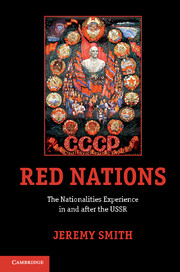Book contents
- Frontmatter
- Dedication
- Contents
- Tables
- Preface
- 1 Introduction: the prison-house of nations
- 2 Dispersal and reunion: revolution and civil war in the borderlands
- 3 Bolshevik nationality policies and the formation of the USSR: the Bolsheviks dispute national policy
- 4 Nation-building the Soviet way
- 5 Surviving the Stalinist onslaught, 1928–1941
- 6 The Great Patriotic War and after
- 7 Deportations
- 8 Territorial expansion and the Baltic exception
- 9 Destalinisation and the revival of the republics
- 10 Stability and national development: the Brezhnev years, 1964–1982
- 11 From reform to dissolution, 1982–1991
- 12 Nation-making in the post-Soviet states
- 13 The orphans of the Soviet Union: Chechnya, Nagorno Karabakh, Abkhazia, South Ossetia and Transdniester
- Conclusion
- Bibliography
- Index
- References
2 - Dispersal and reunion: revolution and civil war in the borderlands
Published online by Cambridge University Press: 05 June 2014
- Frontmatter
- Dedication
- Contents
- Tables
- Preface
- 1 Introduction: the prison-house of nations
- 2 Dispersal and reunion: revolution and civil war in the borderlands
- 3 Bolshevik nationality policies and the formation of the USSR: the Bolsheviks dispute national policy
- 4 Nation-building the Soviet way
- 5 Surviving the Stalinist onslaught, 1928–1941
- 6 The Great Patriotic War and after
- 7 Deportations
- 8 Territorial expansion and the Baltic exception
- 9 Destalinisation and the revival of the republics
- 10 Stability and national development: the Brezhnev years, 1964–1982
- 11 From reform to dissolution, 1982–1991
- 12 Nation-making in the post-Soviet states
- 13 The orphans of the Soviet Union: Chechnya, Nagorno Karabakh, Abkhazia, South Ossetia and Transdniester
- Conclusion
- Bibliography
- Index
- References
Summary
The immediate course of the Russian Revolutions of 1917 was decided in the capital cities of Moscow and Petrograd and, indirectly, on the front line between Russian and German armies. But even away from the front lines, in cities around the periphery of the empire the struggle that determined the fate of the Provisional Government was also in evidence. Soviet power was declared in Tashkent before Petrograd. Here the soviet (workers’ council) was almost exclusively Russian, and the Red forces remained isolated from the surrounding, Muslim-populated countryside. The Latvian city of Riga presented an unusual case of a working class dominated ethnically by non-Russians. Latvian workers were solidly pro-Bolshevik, and their influence on the struggle in the capital was reinforced by geographical proximity to Petrograd.
In the cases of both Riga and Tashkent, the overlap of social and ethnic backgrounds shaped the nature of events there already in 1917. As the Revolution developed into civil war the significance of the convergence of nationality and class became ever more apparent, and was one of the key factors behind the eventual victory of the Reds. In Baku, as the Russian authorities were forced out, the stratification of the local workforce along national lines determined the development of the conflict into one between Armenians and Muslims. National parties grew in importance and were the dominant forces in between the fall of the Bolshevik-led Baku Commune in 1918 and the Red Army’s conquest in 1920.
- Type
- Chapter
- Information
- Red NationsThe Nationalities Experience in and after the USSR, pp. 17 - 52Publisher: Cambridge University PressPrint publication year: 2013



